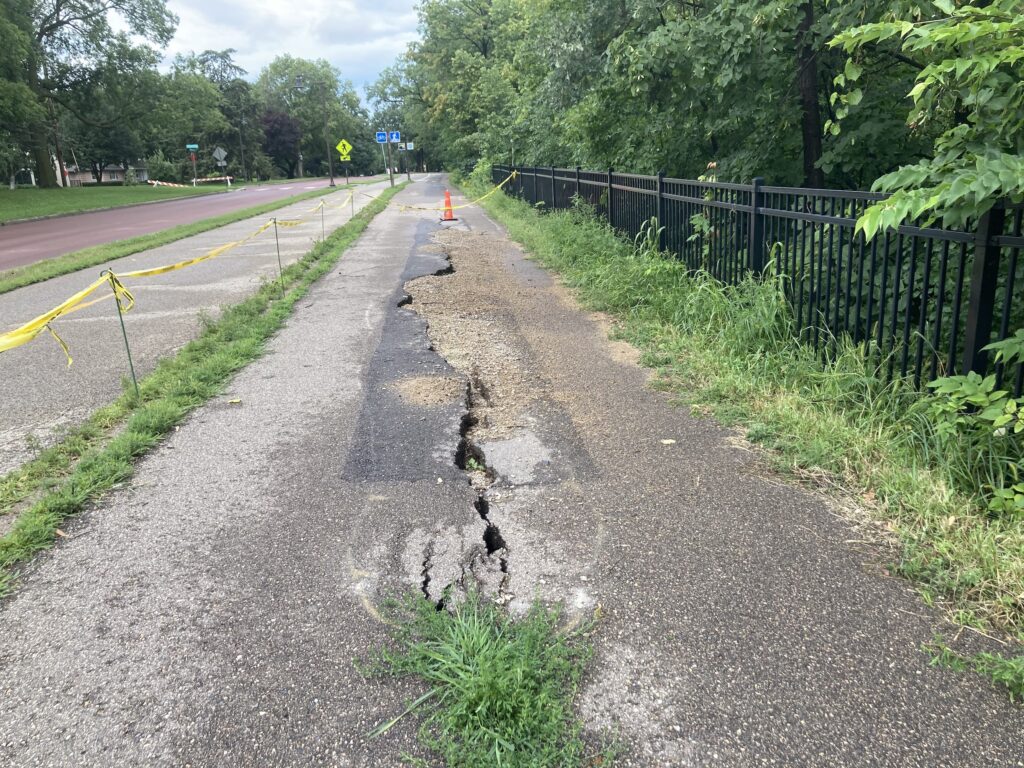3.1 miles
trestle turn around
75 degrees
humidity: 89% / dew point: 71
Ran in-between raindrops. It started raining yesterday afternoon and kept going, off and on, all morning. Then, right before my run, the sun came out. Now that I’m done, it’s dark again. More rain coming.
Everything wet. Slick, too. Mud, puddles, crushed acorns: dangerous. I slipped once but barely. So thick out there! No rowers or roller skiers or regulars. Some bikers, walkers, other runners. Stopped at the sliding bench — the only view was dark green. Then stopped north of the trestle to check out how the crack was doing. The trail is still blocked off with tape and orange cones, the crack has grass where there used to be dirt and is opening up again.

Listened to my “Doin’ Time” playlist on shuffle and was inspired when “Once in a Lifetime” came on, especially this refrain about water
Letting the days go by, let the water hold me down
Letting the days go by, water flowing underground
Into the blue again, after the money’s gone
Once in a lifetime, water flowing underground.
Except, as I was running, I heard the line not as after the money’s gone but after the BODY’S gone, which really fit in with my thinking about time, water, and selfhood and started a train of thought about the I above ground returning to the not-I underground/underwater — or the not-water self above returning to the water self below.
The body’s gone also fit with a reoccurring theme in the playlist: the limits of time and death. “Out of Time” and “Closing Time.” Instead of reading death/body gone as running out of time or no longer having any time, I thought about it as something other than a possession — time flows through us and we flow through time. We don’t spend it or own it, we live in it and with it and through it.
It is time now, I said
In my “On This Day” practice this morning, I encountered a series of lines and ideas about time from 16 aug 2021. I stopped at this entry, not reading any more of the aug 16 entries, and decided that today would be about time. Later I realized how fitting it was to study time in the midst of my attempt at living within Mary Oliver’s poem, “Swimming, One Day in August.” It is time now, I said/ for the deepening and quieting of the spirit/ among the flux of happenings. It is time.
During a swim, I lose track of time, have no idea what time it is, as I swim continuously around the buoys. If time is measured at all, it is in loops. And often, I lose track of those too. Was that 3 loops or 4? I can’t recall.
Maybe time is measured in location? Near one shore or the other, one buoy or the next? Here then there then here again
If there’s something gimmicky about trying to swim the equivalent of one day in August, it’s also a great goal for me: not impossible, but requiring some commitment and swimming more than I would otherwise swim. And it’s concrete and straightforward: be in the water, moving, for a total of 24 hours. And it’s satisfying, watching the minutes increase.
And it does something strange to time and it’s passing. Technically I understand a day to be 24 hours, but I don’t usually think about (or count) some of those hours — like the ones in which I’m sleeping, or the ones in which I’m lost in writing or in reading a book. I don’t think I can quite articulate it right now, but accumulating these minutes is a different type of living in time.
It’s a delightful waste of time. No great accomplishment, just a fun experiment. Of course, it’s only a waste in terms of productive time. I am not achieving anything big here that you might put on a resume. It’s not making money, and it’s not creating a product. It is, I think, making me faster and stronger, but not in the most efficient ways.
An idea: what about a chapbook titled, Swimming One Day in August, that plays around with different understandings of a day and its relation to time? I could write about this goal, where 1 day = 24 hours. But I could also write about a day = a random day of swimming in august or a collage of days swimming in august from just 2025, or from all of the days I’ve written about since 2017?
For Mary Oliver, a day is the day before in which the narrator went in the afternoon/to the sea/which held me until I grew easy. It is also today, now — It is time now, I said. And it is tomorrow (and the tomorrow after that?) — About tomorrow, who knows anything./ Except it will be time again/for the deepening and quieting of the spirit. Here day is a daily habit. (Another approach to this challenge could be: swimming every day in august. This might be difficult, since I don’t have reliable access to water to swim in.)
I like how Oliver sets up time in this poem. She’s talking about yesterday, today, and tomorrow but without beginning or end. When did this habit start? Was it yesterday, when she was pestered, or was it some other yesterday before that? And when will it end? It is also not linear, involving progress. With its repeated habit, it’s circular, a loop, going to the same place day after day: the sea to be held. Is it the same time every afternoon, or just, vaguely, “afternoon.” And, what counts as afternoon, how late does it go? To me, afternoon is before 5, but to Scott it’s before 6.